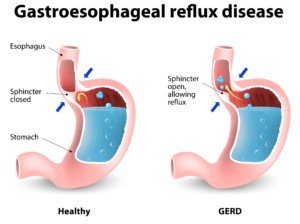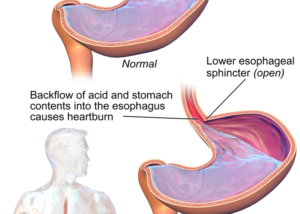
Left sided chest pain is associated with a heart attack or cardiac trouble, so when people experience this, they hope to high heaven it’s only acid reflux.
So the million dollar question is: CAN left side chest pain be caused by acid reflux?
“While occasional acid reflux is normal, chronic acid reflux could be a symptom of a more serious condition known as gastroesophageal disease, or GERD,” explains Lauren Gerson, MD, board certified gastroenterologist formerly with California Pacific Medical Center in San Francisco.
She is a nationally recognized researcher in the field of general gastroenterology including management and treatment of GERD.
“GERD is a chronic disease in which stomach acid flows into the esophagus and irritates the lining,” adds Dr. Gerson.

Shutterstock/Designua
“This acid backup can sometimes cause non-cardiac chest pain, which likely occurs due to the spasm of the esophageal muscles that results from stomach acid refluxing into the swallowing pipe, causing the pain receptors in the area to be activated.”
Though the esophagus is located squarely behind the sternum (chest bone), this doesn’t mean that when it goes into spasm from acid reflux, that the pain must necessarily be felt smack in the center of the chest.
The contractions of the esophageal muscles in spasm could be such that most or even all of the pain is felt on the left side of the chest, or as a left-dominant type of pain.
Unfortunately, the way this actually feels cannot be distinguished from the way a heart related pain can feel – whether it’s from an imminent heart attack, one in progress, or angina (transient shortage of blood flow through the coronary vessels due to plaque buildup).
Having left sided chest pain but have not seen a doctor about acid reflux?
And what if also, you have not seen a cardiologist, and you’re a nervous wreck, struggling to get through each day, hands on chest, terrified the pain might be coming from your heart?
The first doctor you should see is a cardiologist. Get the most serious possibility checked out first.
What You Should Tell the Cardiologist
• Report that you’re having left side chest pain.
• Report any accompanying symptoms of these episodes such as shortness of breath or dizziness.
• Hopefully by the time you see the doctor you will have kept notes on any apparent triggers of this symptom, such as lying down, eating certain foods or anxiety.
• You’ll get a blood pressure check, EKG and stethoscope exam.
• You’ll have blood drawn for a cholesterol test and possibly for other markers that may indicate a potential heart problem.
• A cardiac stress test may be recommended, but if one isn’t, you can always ask for one as a screening procedure.
“In addition to non-cardiac chest pain, it is important for patients to be aware of typical symptoms of GERD including a burning sensation in the chest, regurgitation of food and difficulty swallowing,” says Dr. Gerson.
“If you are experiencing any of these symptoms, as well as non-cardiac chest pain, it is important to talk with your healthcare provider about your symptoms and what treatment options may work best for you.”
If your cardiologist clears you of any heart problem and assures you that your left side chest pain is not cardiac related, then your next step would be to pursue the cause of your anxiety-producing symptom.
• Are you experiencing the symptoms that Dr. Gerson describes?
• Does the left side chest pain occur only when in certain positions or only when lying down?
• Does it occur only in the middle of the night?
• Do certain exercises or movements with your arms bring it on?
• Does it hurt when you press on the area or lie on your chest?
You may not even have GERD or acid reflux; it could be a soft-tissue strain.
At any rate, you should get to the bottom of the cause of your left side chest pain so that your anxiety doesn’t return and cause you to revert back to worrying it’s coming from your heart – even if a cardiologist said that everything is working just fine.
Dr. Gerson passed away in July 2017 after a valiant battle against metastatic melanoma. Dr. Gerson devoted herself to solving her patients’ most difficult and longstanding health challenges.
passed away in July 2017 after a valiant battle against metastatic melanoma. Dr. Gerson devoted herself to solving her patients’ most difficult and longstanding health challenges.
 Lorra Garrick has been covering medical, fitness and cybersecurity topics for many years, having written thousands of articles for print magazines and websites, including as a ghostwriter. She’s also a former ACE-certified personal trainer.
Lorra Garrick has been covering medical, fitness and cybersecurity topics for many years, having written thousands of articles for print magazines and websites, including as a ghostwriter. She’s also a former ACE-certified personal trainer.
.









































